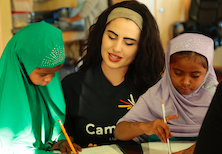This Code of Conduct was designed to support a safe, appropriate, engaging, and meaningful experience for all youth participants at all Camp Fire programs and events events. With youth coming from all different backgrounds and walks of life, we expect that participants will act with kindness and respect towards staff, volunteers, and other youth.
The following code applies to all participants at each of our Camp Fire programs - summer camp, and before and after school. When you register your camper(s) for summer camp or any other Camp Fire programs, we ask that you review this code with them. You will be asked to sign a statement indicating that you have reviewed, and agree to, these policies. You can also download a PDF of this document here.

Camp Fire’s top priority is keeping our participants safe. We are committed to creating an environment for youth that is safe, nurturing, empowering, and that promotes growth and success.
Any form of abuse or mistreatment of youth participants, staff, or volunteers is prohibited. Staff, volunteers, and youth participants shall not engage in the physical, verbal, or emotional abuse or mistreatment of any other staff member, volunteer, or youth participant. Use of abusive language, obscene or profane language, including racial, religious, or sexual references will not be tolerated.
Appropriate Verbal Interactions include:
Inappropriate Verbal Interactions include:
Appropriate Physical Interactions Include:
Inappropriate Physical Interactions Include:
Personal Relationships
Appropriate personal relationships between youth are encouraged. However, Camp Fire strongly discourages romantic relationship between youth participants while enrolled in Camp Fire programming. Youth are not permitted to sit on other’s laps, give full-frontal hugs, or kiss other youth participants. Romantic relationships between youth participants and Camp Fire staff or volunteers are absolutely prohibited.
One-on-One Interactions
Camp Fire seeks to reduce or eliminate situations which involve one-on-one interactions between staff and youth participants, or between two youth participants. We follow the “Rule of Threes,” requiring that there be at least three individuals present in any interaction with youth, to the extent possible.
One-on-one interactions may sometimes be unavoidable. In those situations where one-on-one interactions are necessary, we observe the following guidelines to limit the risk of inappropriate behavior:
If you observe one-on-one interactions between a Camp Fire staff member and a youth participant, or have other concerns, please report them to our Camp Director, Gabby Bittner or our CEO, Amber Grundy (both can be reached at 574-387-6095), or to Praesidium’s Anonymous Helpline (855-347-0751).
Electronic Communications
All communication between Camp Fire staff and volunteers with youth participants must be approved by the participant’s parents/guardians, and must be in an open electronic environment. Staff members are prohibited from sending text messages to youth participants and/or replying to text messages from a youth participant. All email communications with youth participants must be directed to their parents or guardians, and/or their parent or guardian must be copied on all such communications. Staff and volunteers are prohibited from all other forms of electronic communication with youth participants, such as instant messaging or direct messaging through social media or gaming platforms.
Staff members and volunteers may not be friends with campers or youth participants on any social media platforms, before, during, or after camp ends, unless the staff member has a relationship with the camper established prior to their employment at Camp Tannadoonah (e.g., a relative, neighbor, or attended camp together in the past), and has verified that relationship with the Camp Director. Staff members must not request to be friends with, or follow, any youth participants on social media, and must decline any friend or follow requests from youth participants. Staff members may communicate online with youth participants only on the closed (and monitored) Facebook page set up by Camp Fire.
Alcohol, Drugs, Tobacco, and Controlled Substances
Possession and/or use of alcoholic beverages, drugs, tobacco, or other controlled substances while on Camp Fire grounds or at any Camp Fire program is strictly prohibited. Individuals will not be permitted to participate in any Camp Fire youth programming while under the influence of alcohol, drugs, or controlled substances. If a youth participant is found to be in possession of, or under the influence of, alcohol, drugs, or controlled substances, their parents, guardians, and/or appropriate authorities will be notified as necessary.
Bullying
Camp Fire further has zero tolerance for behavior that is classified under the definition of bullying and will take the necessary steps to eliminate such behavior. Bullying is defined as aggressive behavior that is (1) intentional, (2) repeated over time, and (3) involves an imbalance of power or strength.
Bullying can take various forms, including:
Anyone who sees an act of bullying and encourages it or does not intervene to stop it, is also engaging in bullying. This applies to all youth, staff, and volunteers.
Weapons
Camp Fire wants to provide a safe environment for all staff, volunteers, and participants in our programs. Any individual in possession of a weapon, or using any object as a weapon, or in a threatening manner, may be dismissed from Camp Fire programming.
Violence
Violence and threats of violence will not be tolerated at our programs, on our grounds, in our facilities, or in facilities being utilized for Camp Fire programming. Individuals who threaten violence will be asked to leave, dismissed from programs, and authorities contacted if appropriate.
Disruptive Behavior
Camp Fire cannot accommodate participants who display chronic or severely disruptive behavior. Such behavior may be grounds for dismissal from Camp Fire programs. Chronically disruptive behavior is defined as verbal or physical activity, which may include, but is not limited to:
Students may be dismissed without warning from Camp Fire Programs for behavior that inflicts physical or emotional harm on children or staff (i.e., verbally or physically threatening behavior, fighting, spitting, throwing objects that could harm others, etc.).
In general, a first offense is acknowledged by a verbal warning; the second by a written warning and a discussion with the youth participant about the consequences of continuing the behavior. At this point a parent will be notified. A third warning requires a meeting with the parent or guardian, and the final step may be either suspension for a specific period of time (a number of days, a week or weeks) or for the duration of the program. These steps may vary depending upon the severity of the misbehavior.
Vandalism
Vandalism of Camp Fire facilities will be grounds for dismissal from Camp Fire programming. This includes writing on surfaces in cabins and around camp, including, but not limited to, walls, ceilings, beds, mattresses, tables, chairs, and floors. Individuals who damage or vandalize camp property will be fined for each instance of vandalism, and authorities may be contacted when appropriate.
Reporting
It is imperative that everyone, including youth participants, parents, guardians, staff, and volunteers actively participate in the protection of the youth in our programs. In the event that an individual observes suspicious or inappropriate behaviors and/or policy violations on the part of staff, volunteers, or youth participants, it is their personal responsibility to immediately report their observations or concerns to our Camp Director, Gabby Bitter, or CEO, Amber Grundy. They can be reached at info@riverbendcampfire.org or 574-387-6095.
All of our Camp Fire and Camp Tannadoonah staff are required read and agree to our Youth Protection Policies and our Staff and Volunteer Code of Conduct annually.




Young people want to shape the world.
Camp Fire provides the opportunity to find their spark, lift their voice, and discover who they are.
In Camp Fire, it begins now.


